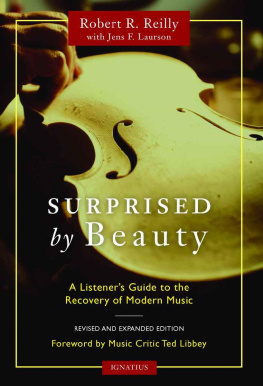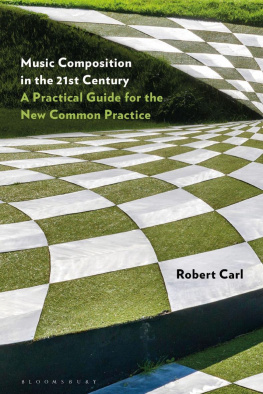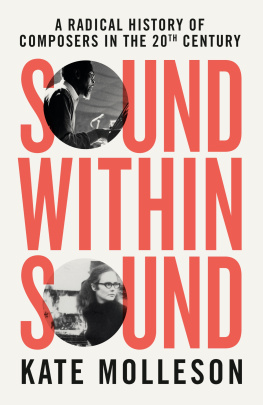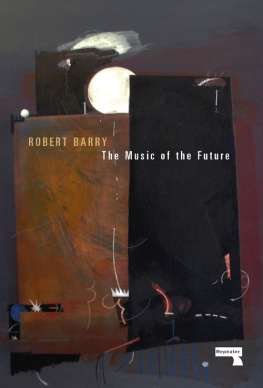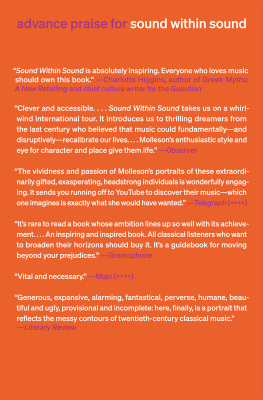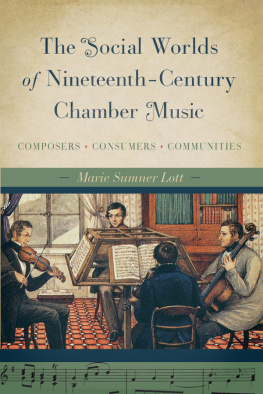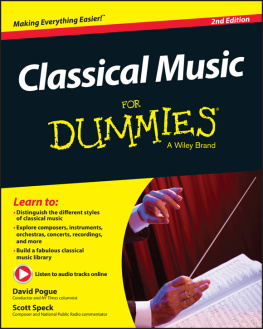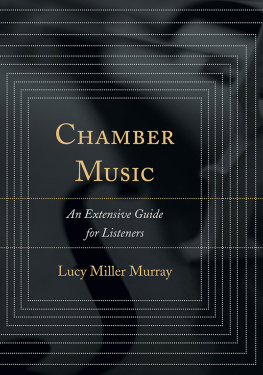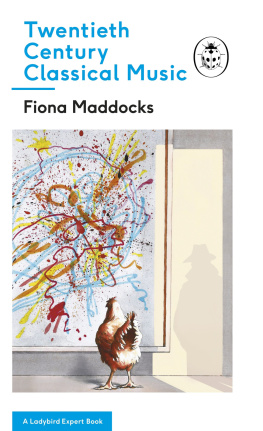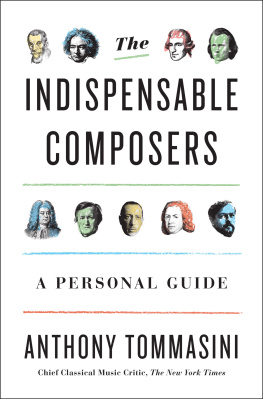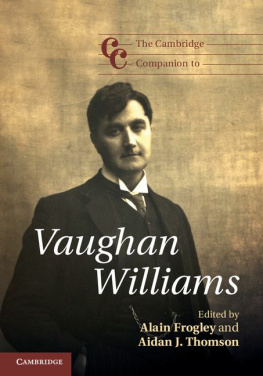SURPRISED BY BEAUTY
Surprised by Beauty
A Listeners Guide to the
Recovery of Modern Music

REVISED AND EXPANDED EDITION
By Robert R. Reilly
with Jens F. Laurson
Foreword by Ted Libbey
IGNATIUS PRESS SAN FRANCISCO
Original edition 2002 by Robert R. Reilly
Cover photo from iStockphoto.com
Cover design by John Herreid
2016 by Ignatius Press, San Francisco
All rights reserved
ISBN 978-1-58617-905-2 (PB)
ISBN 978-1-68149-704-4 (EB)
Library of Congress Control Number 2014944003
Printed in the United States of America
Para Blanca, la verdadera msica
[In] sound itself, there is a readiness to be ordered by the spirit, and this is seen at its most sublime in music.
MAX PICARD
Contents
Foreword to the First Edition
Shortly before the turn of the last century, in an essay titled Criticism, the great American writer Henry James penned a few lines that go to the very crux of what it means to be a critic and to write about the arts. The critical sense is so far from frequent, he wrote, that it is absolutely rare, and the possession of the cluster of qualities that minister to it is one of the highest distinctions.... In this light one sees the critic as the real helper of the artist, a torch-bearing outrider, the interpreter, the brother.
Absolutely rarewith those two words James drove home the point, as valid now as it was then, that real criticism is profound and penetrating, an art in itself; that it requires vision, a keen mind, vast experience, and a wealth of knowledge, along with an understanding of the artistic enterprise and a sense of the sublime. Its dispiriting that so little of what is written about the arts today actually measures up to this standard and that so few of those who write about the arts have torches capable of lighting the way. Among those few, Robert Reilly certainly stands out. Indeed, in many ways he epitomizes the kind of critic James was writing about. Yet I wonder what James himself would have thought of the 20th century, of which he witnessed only the first 15 years. In particular, I wonder what James would have made of a century in which, for quite a few creators, art ceased to be what he said it should be: a search for hard latent value. In so many ways, 20th-century artand music stands right up there at the head of the paradewas a search for systems and procedures whose purpose was precisely to relieve the artist of any obligation to be concerned with value. And it was a contrived search at that.
Much of it was about poking holes in the pastor as one rather notable European stage director put it a few years ago, about jamming spokes into the wheel to test the quality of the material. Because the 20th century was a time of political and social chaos, of personal alienation and suffering, many 20th-century artists (and critics) reasoned that contemporary art, in order to be valuable, had to somehow reflect that. Art had to be ugly because life was ugly. Indeed, it was the artists duty not to create the illusion of a clean reality but to show how polluted reality is and thus to provide an opportunity for purification. In a society shot through with vulgarity and loudness, music should be vulgar and loud, or at the very least, it should lack beauty.
One can sympathize with this view up to a point. Of course composers and other artists should be free to jam spokes in the wheel. Indeed, there are times when they must do so, as Beethoven did. The arts are one of our best protections against dogmatism of any stripe and a powerful weapon against complacency. But showing us how rotten reality is and how twisted we are, is not their sole purpose. Nor can it be said that the pursuit of complexity for its own sake is a valid aim. Unfortunately, that seems to be what much 20th-century art was about. Process became synonymous with progress, and a vast array of methodologiesartificially contrived systems and procedures based on mechanical or mathematical conceptstook the place of straightforward communication.
Music, by its very nature, was an easy victim of this trend toward reductionism. But some composers resisted, and it is their work that is the subject of this book. In the pages that follow, Robert Reilly redraws the map of modern music. He shows that during the 20th centuryin the midst of what in so many ways was a meltdown of Western culturethere were composers who stood firm and wrote music that was bold and original yet also rooted in the emotions, music that was not only interesting but moving and beautiful. Again and again, what it took to write music like that was couragethe courage of an outrider to hold a torch against the darkness and light the way for others. It is the same kind of courage often needed to stick by ones faith in todays world.
The true artist of any era must seek to give pleasure, to create things expressive of beauty and truth. As we know, the truth can sometimes be troubling. It can also be powerful, dramatic, moving, consoling, and celebratory. This concept of the artists mission was what guided Mozart and Michelangelo. And in their hands artistic expression became, in effect, praise of creation and of the Creator. As this book makes clear, the best music of the 20th century also, in spite of the odds, succeeded in doing that. It developed our capacity for feeling, deepened our compassion, and furthered our quest for and understanding of what Aristotle called the perfect end of life. In short, it drew us closer not to mere reality but to God.
Ted Libbey
Author of The NPR Guide to Building a Classical CD Collection
Preface to the Second Edition
Contemporary music, by which I mean music of the 20th and 21st centuries, has been my preoccupation. When discussions began about the possible content of the first edition of Surprised by Beauty (2002), it turned out that the majority of my columns for Crisis magazine from the previous ten years had been about this era. This was not the product of any design on my part but simply reflected my desire to understand what was going on around me. More than 14 years later, there is even more to try to understand.
What I had heard, in part, was lots of noise, and I was intrigued as to how it had gotten itself passed off as music. In an interview with British music critic Martin Anderson, German composer Claus Ogerman said, Look back at Donaueschingen (the German Mecca of the avant-garde), where theyve been playing modern music since 1923 or 24theyve premiered 2,000 compositions there, of which none has left any mark. Its as if you had a factory producing things that werent working. The remark is more amusing than accurate, but I have been fascinated as to why almost an entire century devoted itself to producing music that doesnt work and even more curious about the relatively unknown music written during that same period that does work. Lets call it, as does one music professor, the other 20th century.
I wondered how the composers of beauty had sustained themselves during a period of such confusion and downright hostility. That was the subject of my book, and it is now, thankfully, an old story. The younger generations of composers, who had had enough of the enforced sterility of mandatory dodecaphony (also known as 12-tone technique, the composition method devised by composer Arnold Schoenberg), and they decisively rebelled against and repelled the forces of noise. Even if you are a music loverlike many I knowyou probably have not come all the way out of the bunker into which you retreated to survive the 20th-century assault of noise. But its okay: The war is over. You can come out now. The army of noise emptied its lungs screaming its loudest and then whimpered away.
Next page
